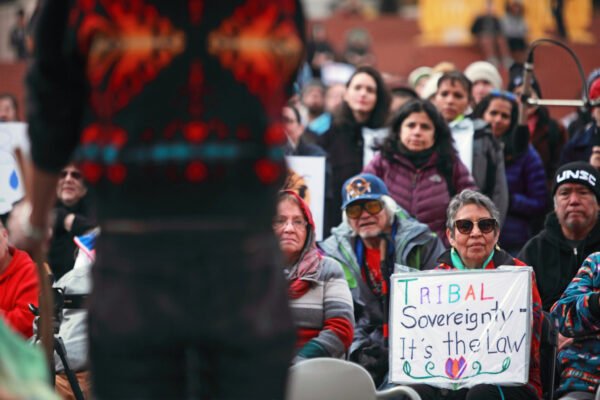By Legal Director Mat dos Santos
Today I’m especially proud to live in Portland, which is celebrating Indigenous Peoples’ Day for the first time. On Wednesday, October 8, 2015, through a unanimous vote by the city council, Portland abandoned Columbus Day for Indigenous Peoples’ Day. Portland joins a handful of U.S. cities to make this change. While symbolic, this is an important shift in policy away from erasing Native tradition to celebrating it.
Native Americans throughout the U.S. routinely find themselves faced with an impossible choice: celebrate Native traditions in Native spaces or let Native traditions die while participating in majority culture. This forced choice is a legacy of genocide and ongoing social depredation perpetuated against indigenous people.
Today, this cultural annihilation is continued through innocuous institutional rules and regulations that may seem harmless, but which have a disparate impact on Native people and traditions. These rules and regulations discriminate against Native people because the needs of Natives were not considered in the policy making process. An example of such a rule can be found in Oregon’s institutions of higher education; not a single one allows Native students to practice traditional smudging rituals in their living spaces.
Smudging ceremonies are a custom of some Native cultures. In most smudging ceremonies, one or more plants are placed in a fireproof bowl or shell, lit briefly, then allowed to smolder. A feather, fan, or similar apparatus is used to aid the burning and waft smoke around oneself and living space creating a bath of smoke. This cleansing smoke bath purifies the body and space.
When pushed on why smudging is not permitted in living spaces, the response from at least one prominent, local higher education institution has been disappointing. Bureaucratic excuses pointing to “no flame” policies or, city and state fire codes, are used to deny earnest requests from students.
The problem with these responses is that the First Amendment guarantees that people of all backgrounds can practice their religion. But the Supreme Court has complicated this area of law in a 1990 decision in Employment Division v. Smith, a highly controversial case originating in Oregon, which has made it difficult to challenge a neutrally written and generally applicable law that (intentionally or not) negatively affects a person’s religious liberty.
Setting aside the constitutional requirements of the First Amendment, public institutions of higher education can and should accommodate Native students’ need to practice their traditions. For example, South Dakota State University created a “ceremonial use” exception to their fire and smoke policies that honors the needs of Native students to engage in practices that maintain their traditions and ceremonies while addressing the school’s safety concerns. Likewise, a city like Portland that has the ninth largest Native population should follow symbolic steps with meaningful revisions to city codes that account for and protect the cultural needs of the Native community.
By continuing to refuse Native students’ requests to smudge, higher education institutions in Oregon will be forced into the unenviable position of stating to the public that, while Native studies are important to their programmatic goals, the actual practices and real religious experiences of Native students are less valuable than their rules prohibiting the use of incense in dormitories - a position that, in keeping with historical practice, positions indigenous people as second class citizens.
This post was updated from the original newsletter story on October 12, 2015.

